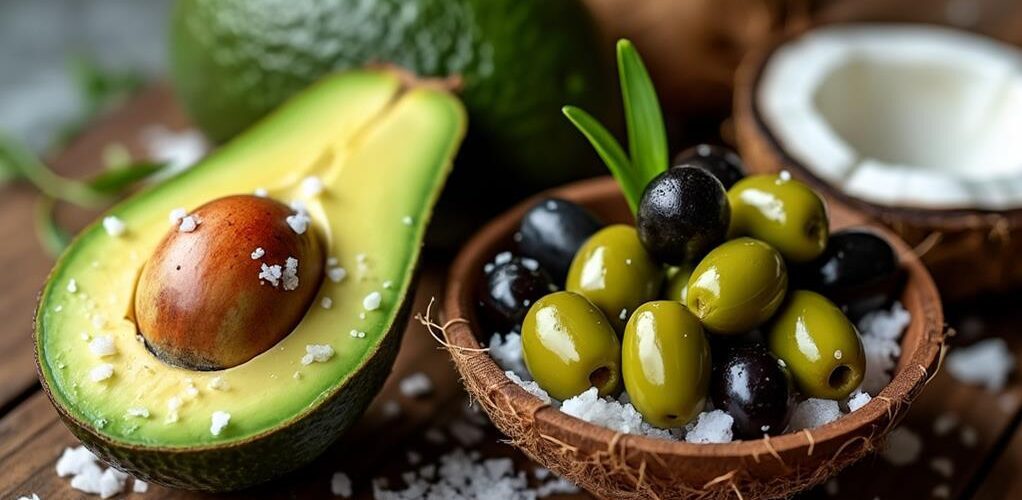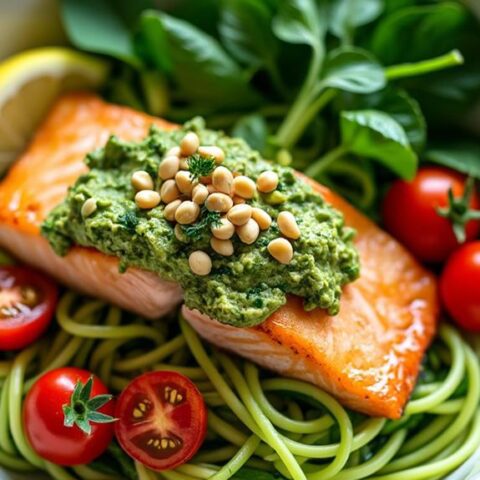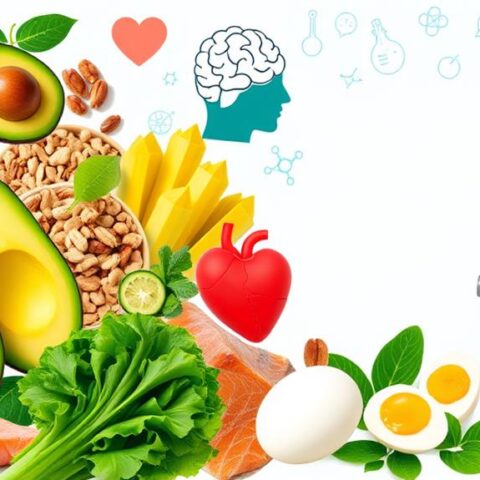
Avocados, strawberries, raspberries, lemons, and watermelon are top choices for a keto-friendly fruit list. Avocados are rich in heart-healthy fats and contain only 1.5 grams of net carbs per 100 grams. Strawberries provide an appealing 8.7 grams of net carbs per cup, alongside antioxidants. Raspberries offer just 6.7 grams of net carbs per cup while reducing inflammation. Lemons, with 4 grams of net carbs per fruit, enhance flavors while providing high vitamin C. Watermelon, although higher in carbs, can be enjoyed moderately, contributing to hydration and heart health. Each fruit adds unique benefits to your keto journey.
Key Takeaways
- Avocados are low in net carbs and rich in healthy fats, ideal for keto diets.
- Raspberries offer low net carbs and high antioxidants, perfect for keto meal plans.
- Lemons provide low carbs and high vitamin C, enhancing keto recipes' flavors.
- Strawberries have a low glycemic index and are rich in vitamin C, suitable for moderation on keto.
- Watermelons, when consumed moderately, offer hydration and essential nutrients for keto followers.
Avocados
Although often mistaken for a vegetable, avocados are a fruit that perfectly align with the principles of a keto diet due to their low net carbohydrate content. With approximately 8.5 grams of carbs and nearly 7 grams of fiber per 100 grams, avocados have a net carb count of just 1.5 grams, making them an exemplary choice for those adhering to a ketogenic lifestyle.
The avocado nutrition profile highlights its richness in heart-healthy monounsaturated fats, which are known to support cardiovascular health and aid in weight management. Additionally, avocados are high in potassium, providing around 975 mg per medium fruit, which is critical for maintaining electrolyte balance, especially important on a keto diet. They also contain vitamins E, K, and B6, contributing to various bodily functions and overall health. Beyond their favorable fat content, avocados are a powerhouse of essential nutrients.
The versatility of avocados allows them to be easily incorporated into a range of avocado recipes, from salads and smoothies to spreads, offering a creamy texture without appreciably increasing carbohydrate intake. Their unique nutritional profile makes them a staple in any keto-friendly meal plan.
Strawberries
Following avocados, another fruit that fits well within the parameters of a ketogenic diet is strawberries. With approximately 11.7 grams of carbohydrates per cup and a net carb count of around 8.7 grams after accounting for 3 grams of fiber, strawberries are a viable option for those adhering to a low-carb lifestyle. Their low glycemic index further underscores their suitability for keto enthusiasts, as they do not greatly spike blood sugar levels.
Strawberries are rich in antioxidants such as anthocyanins and ellagic acid, which contribute to their health benefits by supporting heart health and potentially reducing inflammation. A single cup of strawberries provides approximately 149% of the daily recommended intake of vitamin C, which is essential for immune function and skin health.
Incorporating strawberries into keto recipes can add flavor and variety, making them a popular choice for snacks and desserts. Their nutritional profile allows for creative culinary applications without exceeding carb limits. Below is a summary of their nutritional highlights:
| Nutrient | Amount per Cup | Health Benefit |
|---|---|---|
| Carbohydrates | 11.7 grams | Low net carbs for keto |
| Fiber | 3 grams | Promotes digestive health |
| Vitamin C | 149% RDI | Enhances immunity |
Raspberries
Raspberries are a nutrient-dense fruit that aligns well with the parameters of a ketogenic diet, offering a low net carbohydrate content. With only about 6.7 grams of net carbs per cup, raspberries present a viable low-carb option for those adhering to keto dietary guidelines.
They are rich in antioxidants, which confer significant raspberry health benefits, such as reducing inflammation and potentially lowering the risk of chronic diseases. The antioxidant properties play a vital role in promoting overall health and wellness. Additionally, just like leafy greens such as spinach and kale, raspberries can support your keto journey with their nutrient density.
Furthermore, raspberries are an excellent source of vitamin C, providing approximately 54% of the recommended daily intake per cup. This contributes to enhanced immune function and supports skin health.
Additionally, raspberries contain manganese, an essential mineral for bone health and metabolic processes, offering about 41% of the daily value in a single cup serving.
Their natural sweetness and tartness make raspberries a versatile ingredient in keto cooking. Raspberry recipe ideas abound, from incorporating them into fresh salads to blending them into smoothies or using them as a topping for keto-friendly desserts.
These diverse culinary applications guarantee that raspberries can be enjoyed in various ways while adhering to a ketogenic lifestyle.
Lemons
Lemon enthusiasts will be pleased to know that this citrus fruit is well-suited for a ketogenic diet, with a low net carbohydrate content of about 4 grams per fruit. This makes lemons an ideal choice for those adhering to low-carb nutritional guidelines.
Rich in vitamin C, lemons support immune health, acting as potent antioxidants to mitigate oxidative stress, a common concern for many individuals. In addition, their modest calorie count—only 17 per fruit—means they can enhance flavors without greatly impacting daily carb limits.
Lemons also have properties that may stabilize blood sugar levels, aligning with keto goals of improved metabolic health. Including lemons in your diet can provide numerous health advantages. Their ability to aid digestion and potentially stabilize blood sugar levels aligns well with the goals of a ketogenic lifestyle.
Moreover, their high acidity can dramatically enhance the taste of meals and beverages, making them a versatile addition to any keto-friendly recipe repertoire. Whether incorporated into a keto lemon chicken or used to prepare an invigorating lemon-infused water, lemons offer both nutritional benefits and culinary versatility.
Watermelon
Amidst the array of fruits suitable for a ketogenic diet, watermelon stands out as a hydrating option with a moderate carbohydrate content. With approximately 11.5 grams of carbohydrates per 1-cup (152-gram) serving, it fits well within the keto framework when consumed in moderation. The fruit's net carb count of around 11 grams, after accounting for its 0.5 grams of fiber, allows it to be included in daily carb limits, offering a revitalizing alternative to higher-carb fruits.
Watermelon benefits extend beyond its carbohydrate profile. It is significantly rich in vitamin C, providing about 21% of the daily value per serving. This supports immune health and contributes to skin health, essential for overall wellness. Additionally, watermelon contains lycopene, which is known for its cardiovascular health benefits, including potentially lowering LDL cholesterol and improving heart health.
Moreover, the presence of lycopene, a powerful antioxidant, is associated with reduced risks of certain cancers and heart disease, making watermelon a precious addition to a health-conscious diet. With a water content of approximately 92%, watermelon is exceptionally effective for hydration, particularly in hot weather or post-exercise.
Incorporating watermelon recipes into your diet can offer both flavor and nutritional benefits, making it an appealing, keto-friendly choice.
Frequently Asked Questions
What Is the Most Keto-Friendly Fruit?
The most keto-friendly fruit is the avocado, distinguished among keto fruit options due to its exceptionally low net carb content of approximately 1.5 grams per 100 grams, making it the ideal choice for those seeking low carb fruits.
Can You Go Into Ketosis if You Eat Fruit?
Yes, consuming keto fruit options can allow one to enter ketosis, provided they are low in carbohydrates and consumed in moderation. Their impact on ketosis is minimal when adhering to daily carb limits and focusing on net carbs.
What Fruits Are Not Keto-Friendly?
Fruits with high carb content, such as bananas, apples, oranges, cherries, and peaches, are not keto-friendly due to their significant fruit sugar content. These high carb fruits can disrupt ketosis by exceeding low-carb dietary limits.
How Many Fruits a Day on Keto?
On a ketogenic diet, fruit portioning is essential. Typically, 1-2 servings of low-carb fruits, such as avocados or berries, are integrated into keto meal planning to maintain daily carbohydrate limits between 20-50 grams, ensuring ketosis.
Conclusion
To summarize, the incorporation of certain fruits into a ketogenic diet can provide essential nutrients while maintaining low carbohydrate intake. Avocados, with their high healthy fat content and minimal carbohydrates, are particularly suitable. Strawberries and raspberries offer antioxidants and fiber, making them excellent choices for maintaining dietary balance. Lemons, although used sparingly, add flavor and vitamin C. Watermelon, when consumed in moderation, provides hydration and essential vitamins. These fruits collectively support nutritional adequacy within the parameters of a ketogenic lifestyle.










No Comments